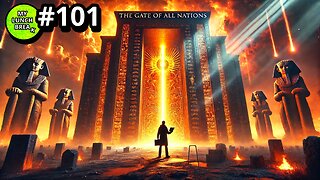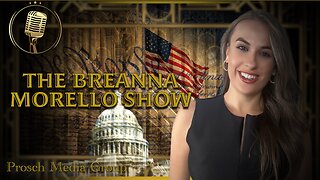Premium Only Content

George Washington was NOT A FREEMASON (Exposed in 6 minutes)
George Washington Was Never a Freemason: A Nation Unchained
Imagine this.
What if George Washington was never a Freemason?
Here is what could have been.
Imagine this.
In the year 1773, George Washington, a prominent figure in the American colonies and a leader of the burgeoning rebellion against British rule, faced a pivotal decision.
He stood at a crossroads, one that would forever alter the course of American history.
George Washington, the man who would later become the first President of the United States, had been invited to join the ranks of the Freemasons.
However, he declined the invitation.
Little did he know that this seemingly inconsequential decision would lead to a series of events that would reshape the destiny of a nation.
Chapter 1: The Unbroken Chain
As the American colonies became increasingly discontent with British rule, secret societies like the Freemasons played a significant role in the formation of revolutionary ideas.
Washington's decision not to become a Freemason was a deviation from the norm among the colonial elite.
This refusal marked the beginning of a divergence in his destiny from that of many of his contemporaries.
Without the protective network and influence of the Freemasons, Washington found himself in a more vulnerable position.
His leadership in the Continental Army and later in the Continental Congress made him a prime target for British intelligence, who saw him as a threat to their rule.
As the Revolutionary War intensified, several assassination attempts were made on his life, with the British hoping to decapitate the rebellion by eliminating its charismatic leader.
Chapter 2: The Battle for Independence
Despite the dangers, George Washington's unwavering dedication to the cause of American independence persisted.
He continued to lead the Continental Army, albeit with a heightened sense of caution.
The absence of Freemason connections forced him to rely even more on his strategic brilliance and the loyalty of his troops.
In the summer of 1776, the Continental Congress debated the drafting of a Declaration of Independence.
In this alternative history, Washington's absence from the Masonic fraternity led to a different dynamic within the Congress.
The Masons, who had played a significant role in promoting Enlightenment ideas and revolutionary fervor, lacked a central figure to rally around.
Consequently, the drafting of the Declaration of Independence was delayed, with many of its most fervent proponents struggling to gain consensus.
Months passed, and the British, aware of the internal strife among the American colonies, seized the opportunity to crush the rebellion.
Without a unified declaration of independence, the colonies remained divided, and the British forces gained ground.
Chapter 3: The Dark Days
As the war raged on, George Washington continued to fend off assassination attempts.
His extraordinary leadership skills kept the Continental Army from crumbling.
Still, without the cohesive support of the Masonic brotherhood, the war effort became increasingly desperate.
By 1778, the British occupied Philadelphia, the former capital of the United States, and inflicted a crushing defeat on the Continental Army at the Battle of Monmouth.
Despair swept across the American colonies as the dream of independence seemed to fade away.
The absence of the Masonic influence had left the American revolutionary spirit fragmented and uncoordinated.
Chapter 4: The Assassination
In the darkest days of the American Revolution, George Washington's enemies within the colonies saw an opportunity.
A group of Loyalists, emboldened by the disarray within the American ranks, plotted to assassinate the rebel leader.
They believed that with Washington out of the picture, the American resistance would crumble.
In the spring of 1779, the Loyalist conspirators executed their plan.
Washington, while traveling through a remote area of New Jersey, was ambushed by a group of armed men.
Despite his legendary leadership on the battlefield, he couldn't escape the surprise attack.
The first President of the United States fell to a hail of gunfire on a dusty road, forever altering the course of history.
Chapter 5: A Fragmented Nation
The assassination of George Washington sent shockwaves throughout the colonies.
The American resistance crumbled without his leadership.
The dreams of independence faded as the British tightened their grip on the rebellious colonies.
The war continued to drag on, but without a central figure to rally behind, the American cause seemed doomed.
In the years that followed, the Masonic movement in the United States never reached the heights it did in our reality.
The Scottish Rite and the Shriners never came into existence, and Freemasonry remained a small, relatively obscure society.
Chapter 6: A Different Fate
In this alternate history, the American Revolution remained unfinished.
The British maintained control over the colonies, which were forced to submit to the Crown's authority.
The Declaration of Independence, a symbol of American unity, was never written.
Over time, the American colonies faded into obscurity as a mere extension of the British Empire.
The spirit of independence that had once burned so brightly was extinguished.
The world watched as the American experiment in self-governance became a footnote in history.
Epilogue: A Lesson in Fate
The alternate history of George Washington's decision not to join the Freemasons serves as a reminder of the delicate balance of historical events.
Small decisions and personal choices can have far-reaching consequences, altering the course of nations.
In this timeline, the United States never became a beacon of freedom and democracy, and the world was forever changed by the absence of the American experiment.
History, as we know it, is a tapestry woven from the threads of countless individual decisions, each shaping the destiny of nations and people.
If George Washington was never a Freemason, would the world be as we know it today?
Let us know your thoughts in the comment section below.
-
 17:07
17:07
Old Fashion Masonic Podcast
7 months agoThe Freemason Story of Dave Thomas
421 -
 10:03
10:03
Tundra Tactical
14 hours ago $14.84 earnedBrandon Herrera Vies Bid for ATF Director!
87.7K15 -
 22:01
22:01
DeVory Darkins
1 day ago $35.30 earnedHakeem Jeffries SHUTS DOWN The View as Matt Gaetz Speaks out
77.1K126 -
 2:02:54
2:02:54
Mally_Mouse
13 hours agoLet's Play!! - Spicy Saturday
57.2K2 -
 1:33:06
1:33:06
Slightly Offensive
13 hours ago $29.98 earnedAre You Ready for What's Coming Next? | Just Chatting Chill Stream
74.5K40 -
 32:10
32:10
MYLUNCHBREAK CHANNEL PAGE
1 day agoThe Gate of All Nations
146K63 -
 13:07
13:07
Sideserf Cake Studio
18 hours ago $3.82 earnedIS THIS THE MOST REALISTIC SUSHI CAKE EVER MADE?
63K4 -
 21:08
21:08
Clownfish TV
1 day agoElon Musk Tells WotC to BURN IN HELL for Erasing Gary Gygax from DnD!
50.6K16 -
 48:22
48:22
PMG
13 hours ago $11.29 earned"IRS Whistleblowers Speak Out on Biden Family with Mel K In-Studio"
40.7K25 -
 2:59
2:59
BIG NEM
15 hours agoLost in the Wrong Hood: Who Do I Check In With?
30.8K2